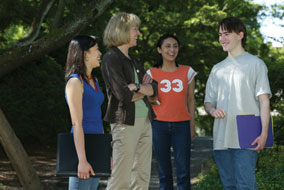
Dean of Arts Nancy Gallini (second from left) talks to graduating students - photo courtesy of Faculty of Arts UBC Reports | Vol. 52 | No. 8 | Aug. 3, 2006
Arts Faculty Launches Coordinated Program Streams
By Duncan M. Mchugh
Leaving the confines of high school for university can make for a daunting transition.
This is especially true in the Faculty of Arts at UBC, where roughly 1,800 first-year students will take their first steps into academia this September.
Take Alex Thureau, 18, who comes to UBC after graduating from Collingwood School.
“I haven’t had to make friends in a long time,” says Thureau, who is considering a career in law. “It’ll be interesting to see where I’ll fit in.”
Thureau is one of 400 students who will start UBC this fall in the new Coordinated Arts Program, or CAP. The program started as a pilot last year and is now being launched as a full first-year option.
Partly designed to help ease the transition to university, each CAP stream links together three or more courses in a standardized timetable of 100 first-year students, creating small learning communities.
Divided into four thematic streams, the program offers instruction in writing and communication. The Faculty of Arts continues to offer Arts One, the flagship first-year program focusing on the Humanities through the study of classic works of literature.
“Very often students come to UBC thinking this is just a massive high school,” says Prof. John Xiros Cooper, Arts Associate Dean, Students.
“But in fact, it’s a whole other way of learning and the whole paradigm has shifted. This is a way of giving students some instruction in the fact that they’re now learning in a new way.”
This year, CAP is being offered with four stream options:
- “Global Citizens,” which includes courses in English, geography, political science and sociology;
- “PPE: Political science, philosophy, economics;”
- “Individual in Society,” which brings together economics, English, and psychology;
- “Foundations in Ecology and Sustainability,” which integrates credits for geography, history, philosophy, and sociology, as well as first-year English credits.
These options, with the exception of PPE, include six credits of an Arts Studies Seminar, or ASTU 100, which is limited to 25 students per seminar and provides instruction in writing. It is hoped ASTU 100 will offer incoming students an intimacy not normally experienced until third year as well as a taste of the research culture in Arts.
For Thureau, who registered in “Global Citizens,” it was CAP’s integration of subject matter that appealed the most.
“It’s nice to have a block timetable where the professors are all working together and communicating,” says Thureau.
The cooperation between disciplines is one of the reasons Dean of Arts Nancy Gallini has championed CAP from its inception.
“With CAP, students are fulfilling their requirements; they are getting depths in the disciplines, and they are also getting the interaction between those disciplines,” Prof. Gallini says. “CAP provides a disciplinary foundation for interdisciplinarity.”
The program builds on pre-existing courses that satisfy requirements for higher-level options. For September’s launch, CAP has bolstered its seminar component and increased the cooperation between courses.
“I think we’ve enhanced what we did in those early pilots,” says Prof. Neil Guppy, Director of CAP and an instructor in “Global Citizens.”
“I have always looked for innovation in undergraduate education that can increase the value-added learning for our students,” he adds. “This looked to me like an innovative way to move forward.”
Prof. Guppy hopes that CAP will expand to 600 students next year and perhaps integrate with other initiatives occurring beyond first year.
The program is one of several initiatives in Arts to support undergrads.
Last year saw the inaugural One Last Lecture, a special event to celebrate fourth-year students. CBC journalist Peter Mansbridge spoke at the Chan Centre for the occasion and each student received an Arts scarf.
Proposed future initiatives include a Majors Day for third-year students and “Global Imaginations,” a special course for students in second year that will include large lectures combined with one-on-one seminars with teaching assistants.
“I think the moves that we’ve made, and the various initiatives we’ve taken have helped,” says Cooper. “Each year-level ought to have some signature event that draws students together as a group, because they’re going through their Arts degree together and I think it’s good to remind them of that.”
Arts Advising has also been revamped and merged with career planning, Co-op Education, and student events planning in the new Centre for Academic Services in Arts. It is all part of an effort to give Arts undergraduates a dynamic education, says Prof. Gallini.
“Over the past couple of years, the focus of this Faculty has been enhancing the learning environment, particularly for undergraduates,” she says.
“What we’re really trying to do is create some cohesion among the four or five years, and to inspire students to continue to learn after they leave UBC.”
Duncan M. McHugh is Programming Director at CiTR’s 101.9fM, UBC’s campus radio station. |
